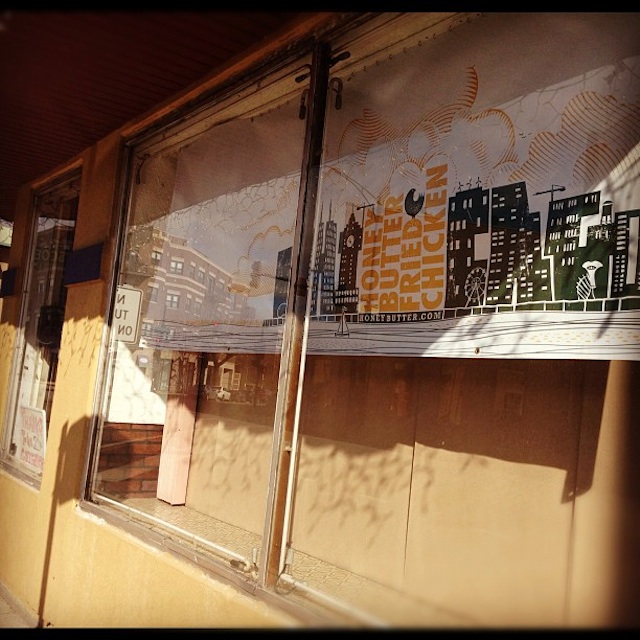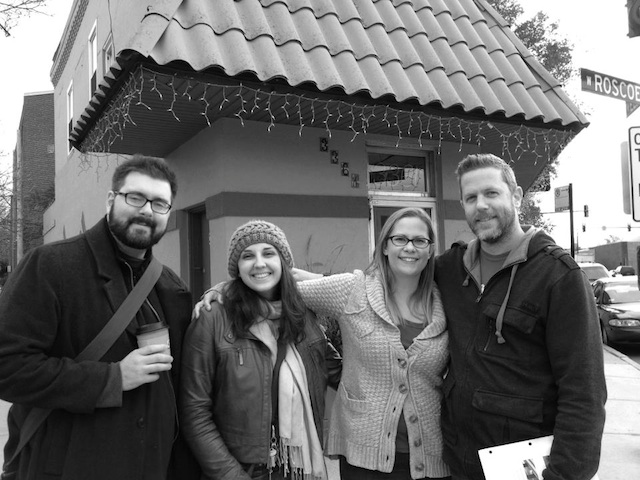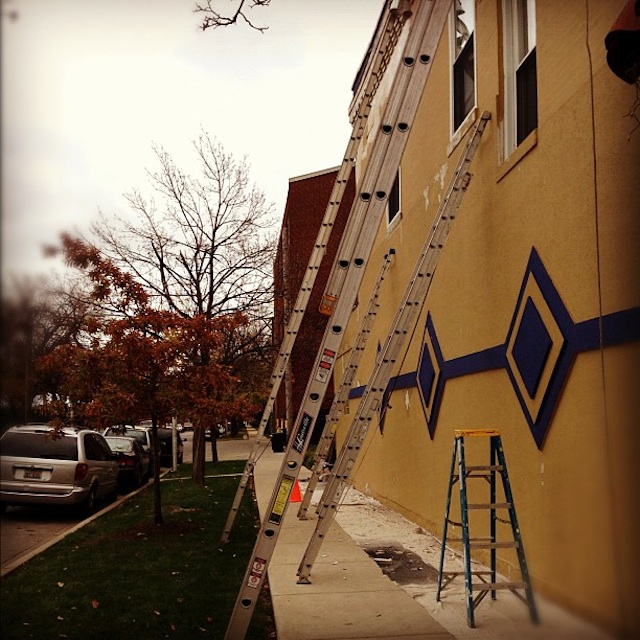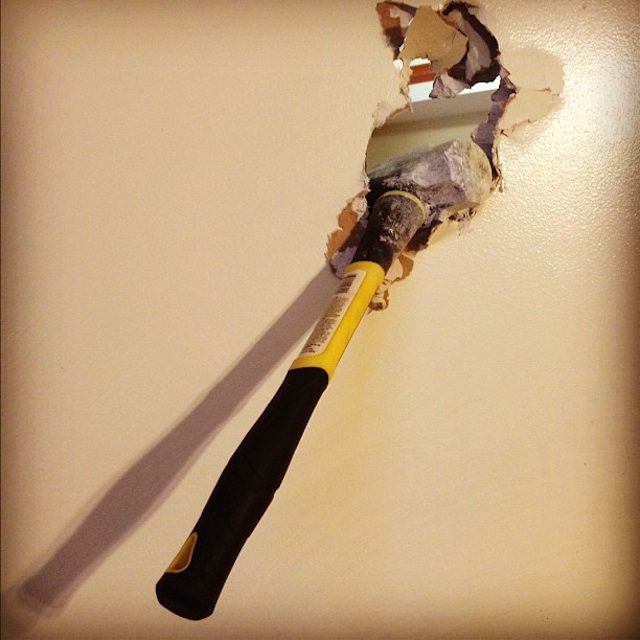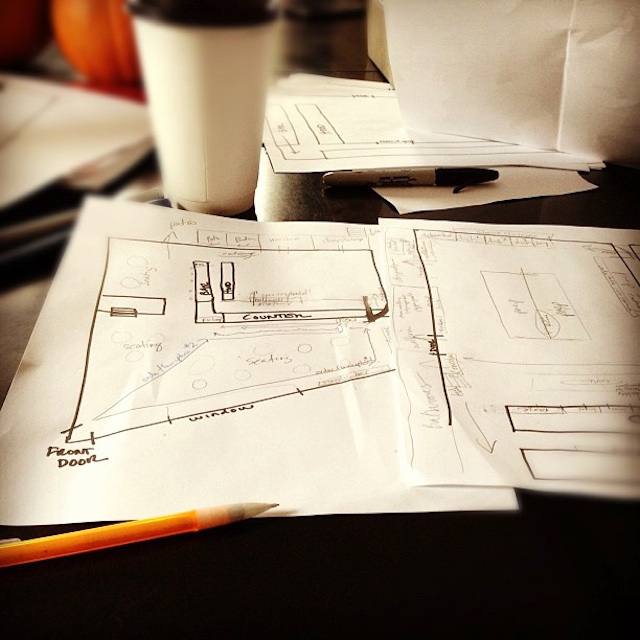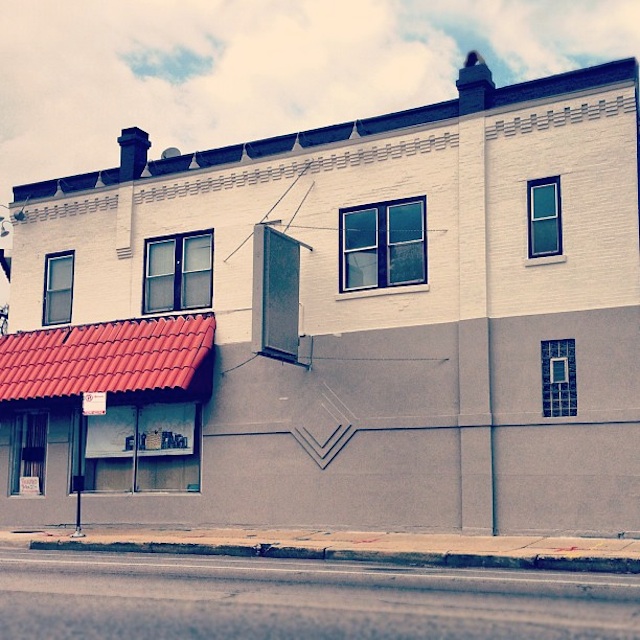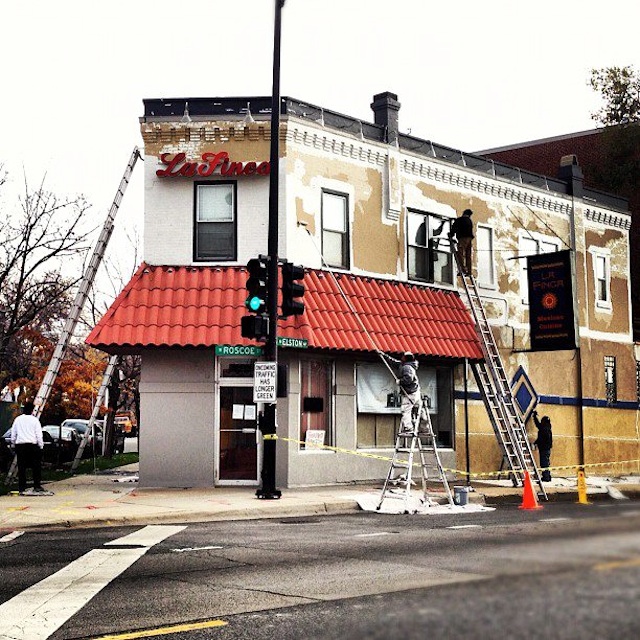How To Find A Space: Honey Butter Fried Chicken Owners Talk About Restaurant Real Estate
By Anthony Todd in Food on Jan 17, 2013 4:00PM
We've been following the saga of Honey Butter Fried Chicken for quite a long time. When owners Christine Cikowski and Josh Kulp announced that they had finally found a space late last year, we wanted to know more. Customers are happy to show up for the glamorous opening, but no one knows about the 16 months it takes to find a place to set up shop. What is it like for a first-time restaurant owner to find a new restaurant? We sat down with Cikowski and Kulp (and their business partner Chris Jennings) and talked about real estate, floods, finding people living in basements and the other twists and turns of opening a new restaurant.
Had either of you ever done "space-finding" before for any of your restaurant ventures?
Cikowski: Josh and I looked for space for Sunday Dinner Club for a long time, but we could never find anything that translated. We looked at a lot of spaces, but we never got far in the process. We were never signing on anything.
Kulp: You get really good at it when you look for a place for 16 months. We are probably the best finders. There came a moment probably three months ago when we literally knew every available space in the city - if anyone needed a restaurant, they should've called us, because we knew more than our real estate agent.
Jennings: You get really good at finding places that don't work.
How does this process start? You have a concept, you have money, but you have nowhere to go.
K: Get a real estate agent. Our guy does primarily restaurants. We got him though Chris Pandel at The Bristol. He's one of those guys who, if you just say an address to him, he'll tell you the square footage, the lease amount, what the owner is like. 'The square footage is good but the owner is a dick;' that kind of thing. He'll know everything.
We started with a vague concept, and the concept has evolved a
little bit, but once we came to a consensus as a group as to what the restaurant was supposed to be like, spaces either could work or couldn't work. We've tried not to change our concept based on spaces. We've seen some great restaurants that were full fine-dining restaurants and thought "Well, maybe we could do fine dining fried chicken" but we stuck to it.
C: The hardest part about it (besides it taking so long) was saying no to a lot of places. It's available, it's ready, it's built and . . . it just doesn't fit us. There was a lot of editing that happened. We had our agent and he was great, but after a while we just took it into our own hands. Josh was searching the internet every day for spaces.
K: You're just driving around and you see a place that may be on its way out and you stop in and ask what's going on. There are just so many variables that have to line up. We've found places that were affordable, good spaces, but were in terrible locations.
Did you know what neighborhood you were looking for?
C: We had an idea of a few neighborhoods that we were targeting. We were looking for the right space. It was more about the feel of the space - we can go anywhere.
K: We've looked pretty much everywhere. It was more about the micro-neighborhood, the block that we're on. Here, there's no residential right around us, so the patio won't be a problem, but 100 feet that way is residential and 100 feet that way is residential.
Did you have any hope that the first space you looked at would work out
K: Oh yeah. Absolutely. We thought it would take 3 months. The agent would give us specs, and we would drive by before we'd look at them and almost every time we'd be like "That's gonna be it!"
C: After a while we just stopped saying that. It was always "We'll see. It's fine." We saw a lot of crazy basements.
Crazy basements?
K: In one location, there was a bed down there, there was a dresser - it was clear whoever owned the restaurant was living down there, and was evicted without having a chance to get rid of his stuff! It was a good location, but it was already taken.
You must have found some fairly ridiculous locations.
C: Oh yeah. There were some spaces that we saw where I questioned the stability of the foundation.
K: One of the nicest places we saw used to be a Mexican restaurant, and it was impeccably beautiful, like a multi-million dollar buildout, in a very tiny space that was one of the saddest things. The flow of the restaurant was so bad. They had the kitchen in the basement in a narrow space you had to duck down to get to. The storage room required you to be a very skinny person. It was amazing what they had done, but I can't believe they spent that money to do that.
C: This space, La Finca, isn't like that. It's not our design style yet, but it totally worked and flowed.
K: If we had nothing and had to open tomorrow, we could do it in this space. I think the bones of this place are really good.
Did you have an idea of what it would cost? When did you decide to buy a building?
C: I don't think we were surprised, but it is very expensive. It is a lot of money, it's non-trivial.
J: The range is huge. It's not consistent. The gamut is huge. A lot of it is finding a place that just went out of business, and that place is looking to recoup their assets. For the first six months, they want a huge amount for all the equipment, and then six months later its half as much. There's this weird period of time after a restaurant has failed where the owner wants to get all of their money back, and they don't get it.
C: We didn't really even think there was an option to buy something, but the space before this one, there was an option to buy, and we realized that was a good option.
J: Especially if you're about to put $300K into building out a space, that's more fun to do when you aren't handing that back to a landlord.
C: We came to that conclusion because we hadn't been able to find an existing restaurant that we could easily convert, so we actually played around with the idea - maybe we'll have to build it. Then we realized we'd be building on someone else's property and there's no way to get that money back. Then we decided we should buy it, and we own it, and it becomes an asset.
J: We don't have to ask anyone's permission. We just collectively agree that this is the way to build out the space and that's what we do.
K: It's much more pleasant when you have a big sledgehammer and you can just go up to a wall, because it's your wall.
Were there spaces you walked into and immediately realized there was no chance?
J: There was one place that we looked at that shall remain unnamed. We went down into the basement and there was a bathtub waterline three feet off the ground. It was the second time we'd looked at it, and it wasn't there the first time. So it had flooded three feet in that time. I think the person just tried to pretend it didn't happen. The furnace and water heater had been sitting in it.
C: You get familiar with that feeling you get when you realize "This is not good." There are a lot of buildings out there that are very old and haven't been maintained. People make it work because they have to, but we didn't want to inherit other people's problems.
What have you learned along the way?
C: in a way it was really good that it took us that long. Through that process, we were able to do a lot of work in advance. Getting an architect, getting a contractor, figuring out costs. We found painters before we had a building. We could lock down all that stuff. We're hoping to shorten our process because we've already done that work in advance.
What about the new space?
C: La Finca was here for 21 years. They were part of the community and there were people who were sad to see them close. I think we played it right - they were ready to move on, and we were ready to move in. That transition was very positive, they had a going away party, they told all their customers about us.
K: They were not in that desperate zone, they were just done. They are ready to move on - The owner was so sweet, the family wants to come to work for us, all of their daughters follow us on Facebook.They're really excited. 20 years is a long time.
K: We genuinely want to be part of the community. We met with the alderman twice. We want to be part of the fabric of the neighborhood. We got a message from the guy who is condo board president across the street - he's excited.
C: Hopefully we'll be able to maintain that legacy of being in a place for a long time and being part of the community.
